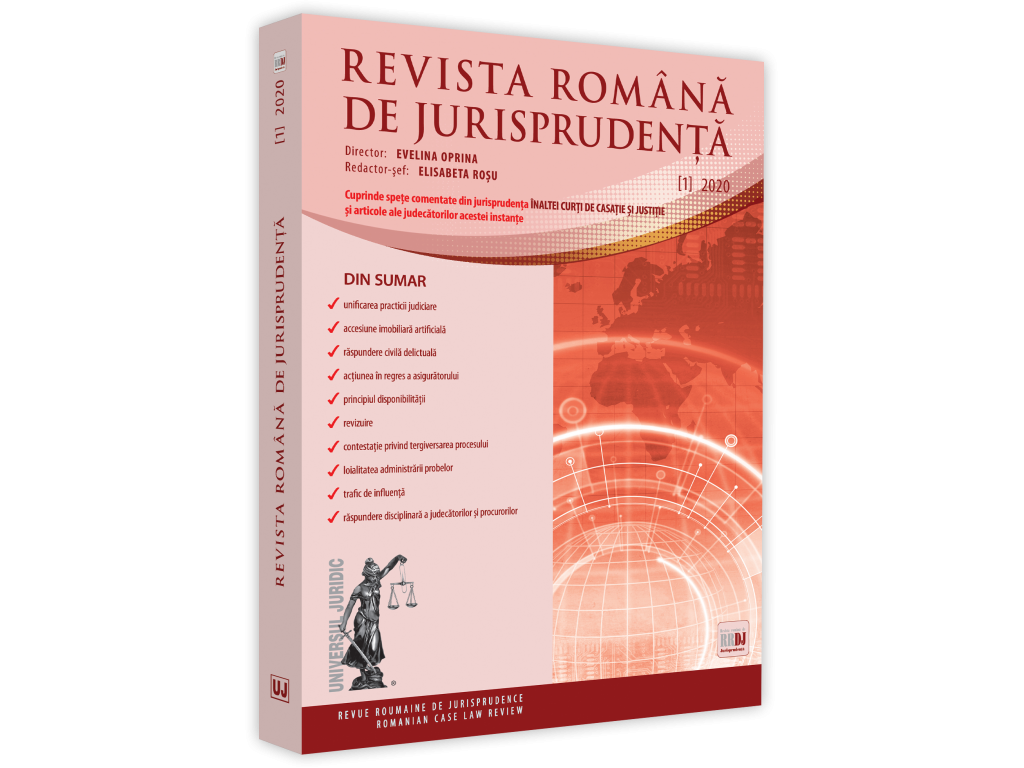Decision issued by APIA (Agency for Payments and Interventions in Agriculture) for the settlement of the preliminary claim filed against the minutes of finding irregularities and establishing the budgetary debts. Legal nature of the inspection report.
CONTENCIOS ADMINISTRATIV ŞI FISCAL
Abstract
The ex-post inspection report, underpinning the issue of the minutes of finding irregularities challenged, being of the legal nature of the document instituting proceedings, the administrative court is not vested with a lawfulness review thereon, but on the minutes of irregularities, the administrative act producing legal effects of administrative law and which should necessarily contain all the factual and legal grounds underpinning the acknowledgment of the existence of those irregularities and the establishment of the budgetary debt affected by irregularities. In the administrative disputes, the provisions of Article 13 of Law no. 554/2004 are relevant, and the issuing authority of the challenged administrative act producing legal effects has been summoned, which is required to submit to the case-file the documents underpinning the issue of the challenged administrative acts, the factual and legal grounds resulting from the content thereof, as it is not necessary to apply Article 161 of Law no. 554/2004, for the purpose of impleading as defendant the issuing authority of the ex-post inspection report. The solution is valid even in the assumption in which this report is deemed as an administrative operation preliminary to the drafting of the minutes. The issuing public authority of the debt instrument, in application of provisions, shall rule on by a reasoned decision regarding the full or partial granting of the challenge or its dismissal and, even if the decision for the challenge settlement is not the individual administrative act, but the administrative act for the settlement of the administrative challenge, issued in the performance of the internal lawfulness review in the special procedure provided for under Article 50 of the G. E. O. no. 66/2011, a species of the graceful appeal, its lack of a statement of reasons shall be harmful for the holder of the challenge, as it does not benefit from an efficient remedy, it does not receive any reply to its allegations contained in that challenge, as its right to defence was obviously infringed. In compliance with the provisions of Article 6 Title I of the consolidated version of the TFEU, as amended by the Treaty of Lisbon, by which the Union recognizes the rights, freedoms and principles mentioned in the Charter of Fundamental Rights of the European Union, proclaimed by the European Parliament, the Council of Europe and the European Commission 2007/C 303/01, where Article 41 provides for the right to proper management, a fundamental European right, in the course of an administrative legal procedure unfavourably settled without informing the holder of the challenge about the reasons for rejecting its claim, as the decision of the authority was not reasoned, this leads to the legal inefficiency of the filed appeal. The proper management represents the assessment scale of the manner of exercise of the discretionary power of the administration, both as a functional structure and due to the competencies of the public officials, by which the internal or judicial lawfulness review is performed. The obligation to reason the decisions resulting from Article 296 para. 2 of the T. F. E. U. and acknowledged as a right according to Article 41 para. 2 letter c) of the Charter of Fundamental Rights of the European Union, represents, as well, an essential component of the right to an actual remedy/appeal acknowledged by Article 47 of the Charter. This obligation requires the indication of the legal basis of the act, of the general situation resulting in its adoption and of the intended general objectives. The statement of reasons should indicate, in a clear and unambiguous manner, the argument followed by the authority which adopted the measure, so that the concerned persons could decide whether they want to defend their rights by bringing a legal action before the court. In compliance with these principles, the case-law of the High Court of Cassation and Justice constantly upheld that the reasoning of an administrative decision cannot be limited to any considerations related to the issuer’s power, however, it should contain factual and legal items which, on the one hand, allow recipients to know and assess the grounds and effects of the decision, and, on the other hand, make possible the exercise of the lawfulness review. The scope and detailed description of the reasoning shall depend on the nature of the adopted or issued act and on the circumstances of each case, an insufficient or wrongful reasoning being deemed to be equivalent to the lack of reasoning.








